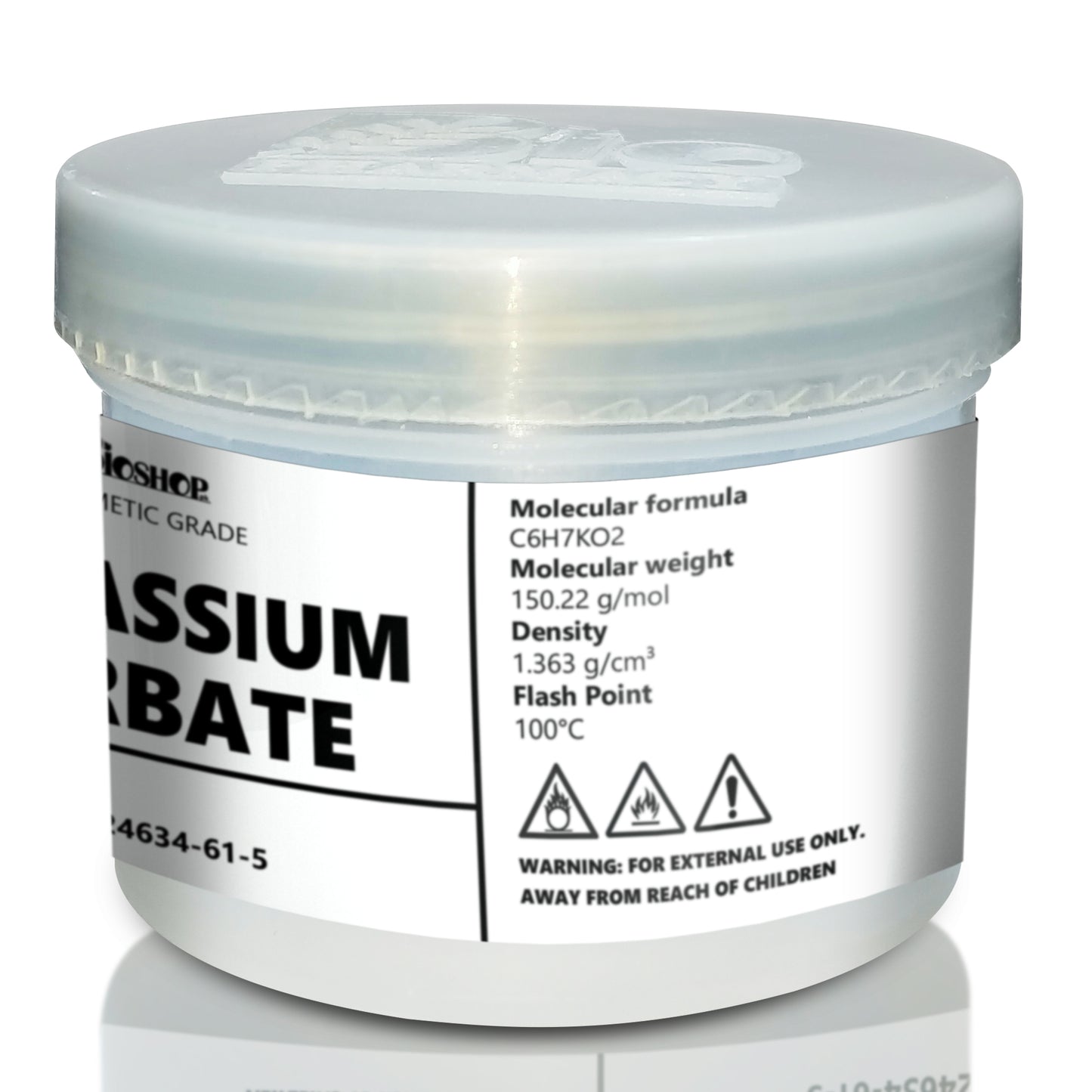Bio Shop
Potassium Sorbate
Potassium Sorbate
Key Functions: Acts as a mild, broad-spectrum preservative that inhibits yeast, mold, and fungal growth in water-based cosmetic products.
Couldn't load pickup availability
Explore
Information About Potassium Sorbate
✅ Key Features
- Effective against mold, yeast, and some bacteria
- Widely used in natural and clean beauty products
- Compatible with other preservatives (like sodium benzoate)
- Non-irritating and ECOCERT-approved
- Ideal for water-based skincare products
🔬 Description
Potassium Sorbate is the potassium salt of sorbic acid — a widely used, gentle preservative in cosmetics and food. In personal care, it’s used to prevent microbial growth in water-containing formulas like lotions, creams, toners, and serums. It is especially effective against fungi and yeast, and is often paired with Sodium Benzoate or Phenoxyethanol to enhance antibacterial protection. Potassium Sorbate is ideal for formulators seeking a mild and eco-conscious preservative system.
📊 Technical Data
INCI Name: Potassium Sorbate
CAS Number: 24634-61-5
Solubility: Water-soluble
Add Phase: Cool-down phase (below 45°C)
pH Stability: Most effective at pH 4.0 – 5.5
Processing Temperature: Use below 45°C
Appearance: White crystalline powder or granules
Odor: Odorless to mildly fruity
Molecular Weight: 150.22 g/mol
Flash Point: Non-flammable
Density: ~1.36 g/cm³
🧪 Recommended Usage
- Usage Rate: 0.1% – 0.5%
- Add during cool-down phase, dissolve in water
- Best used in pH-adjusted formulas (4.0–5.5)
- Combine with sodium benzoate or other preservatives for broader protection
💡 Pro Tip
🧪 For natural preservative systems, combine 0.2% Potassium Sorbate with 0.2% Sodium Benzoate and citric acid to adjust pH. Perfect for DIY toners and creams targeting a clean beauty market!
👩🔬 Skin Type Compatibility
✔️ Safe for all skin types including sensitive, baby, and acne-prone skin
✔️ Non-sensitizing when used within recommended limits
🧴 Formulation Ideas
1. Natural Face Toner
Use Potassium Sorbate and Sodium Benzoate to preserve a refreshing cucumber + rose water toner with niacinamide.
2. DIY Moisturizer for Sensitive Skin
Formulate a fragrance-free lotion with shea butter and panthenol, using Potassium Sorbate as a gentle preservative option.
3. Gel-Based Serum
Incorporate Potassium Sorbate into an aloe-based serum with hyaluronic acid and licorice extract for skin brightening and hydration.
4. After-Sun Soothing Spray
Preserve an after-sun mist containing cucumber extract, chamomile, and panthenol with 0.2% Potassium Sorbate for safety and freshness.
5. Natural Baby Cream
Blend shea butter, calendula oil, and oat extract into a light cream and use Potassium Sorbate to keep it gentle and safe for babies.
💧 Cosmetic Suitability:
Performance rating based on preservative performance, skin safety, and compatibility across product types.
Serums
⭐⭐⭐⭐⭐ – Excellent
🟩🟩🟩🟩🟩 – Ideal for preserving water-based serums with low pH.
Creams & Lotions
⭐⭐⭐⭐☆ – Good
🟩🟩🟩🟩⬜ – Effective when combined with other preservatives in emulsions.
Toners
⭐⭐⭐⭐⭐ – Excellent
🟩🟩🟩🟩🟩 – Perfect for preserving watery toners, mists, and sprays.
Face Masks
⭐⭐⭐⭐☆ – Good
🟩🟩🟩🟩⬜ – Great for sheet masks and water-rich wash-off masks.
Cleansers
⭐⭐⭐⭐☆ – Good
🟩🟩🟩🟩⬜ – Can help inhibit yeast/mold in foaming face washes.
Hair Masks
⭐⭐⭐⭐☆ – Good
🟩🟩🟩🟩⬜ – Adds mild preservation to water-rich conditioning products.
Deodorants
⭐⭐⭐☆☆ – Moderate
🟧🟧🟧⬜⬜ – Useful in natural deodorants to prevent fungal growth.
Eye Creams
⭐⭐⭐⭐☆ – Good
🟩🟩🟩🟩⬜ – Gentle and non-irritating for sensitive formulations.
Shampoos
⭐⭐⭐☆☆ – Moderate
🟧🟧🟧⬜⬜ – Should be combined with stronger preservatives.
Soaps
⭐☆☆☆☆ – Poor
🟥⬜⬜⬜⬜ – Not suitable for cold/hot process soaps.
Conditioners
⭐⭐⭐⭐☆ – Good
🟩🟩🟩🟩⬜ – Works well in low pH, water-rich formulas.
Lip Balms
☆☆☆☆☆ – Not Suitable
🟥⬜⬜⬜⬜ – Not used in oil-based anhydrous systems.
Body Butters
⭐☆☆☆☆ – Poor
🟥⬜⬜⬜⬜ – Only useful in emulsified (not oil-only) butters.
❓ FAQs
Q1: Is Potassium Sorbate enough as a standalone preservative?
A1: It offers good protection against mold and yeast, but it’s best combined with other preservatives for full-spectrum protection (e.g. sodium benzoate or phenoxyethanol).
Q2: Can it be used in natural or organic cosmetics?
A2: Yes, it's ECOCERT- and COSMOS-approved and widely used in natural/clean beauty products.
Q3: Does it affect product texture or scent?
A3: No, it is odorless and does not impact texture or viscosity when used correctly.
Q4: What pH is required for it to work effectively?
A4: It works best in formulas with a final pH between 4.0 and 5.5.
Q5: Is it safe for daily use?
A5: Yes, it is safe and non-sensitizing when used at the recommended levels.
📂 Documentation
Upon request, we will provide.
Where Can You Safely Use Potassium Sorbate
Discover how Potassium Sorbate performs across different products — rated for safety, stability, and effectiveness.







